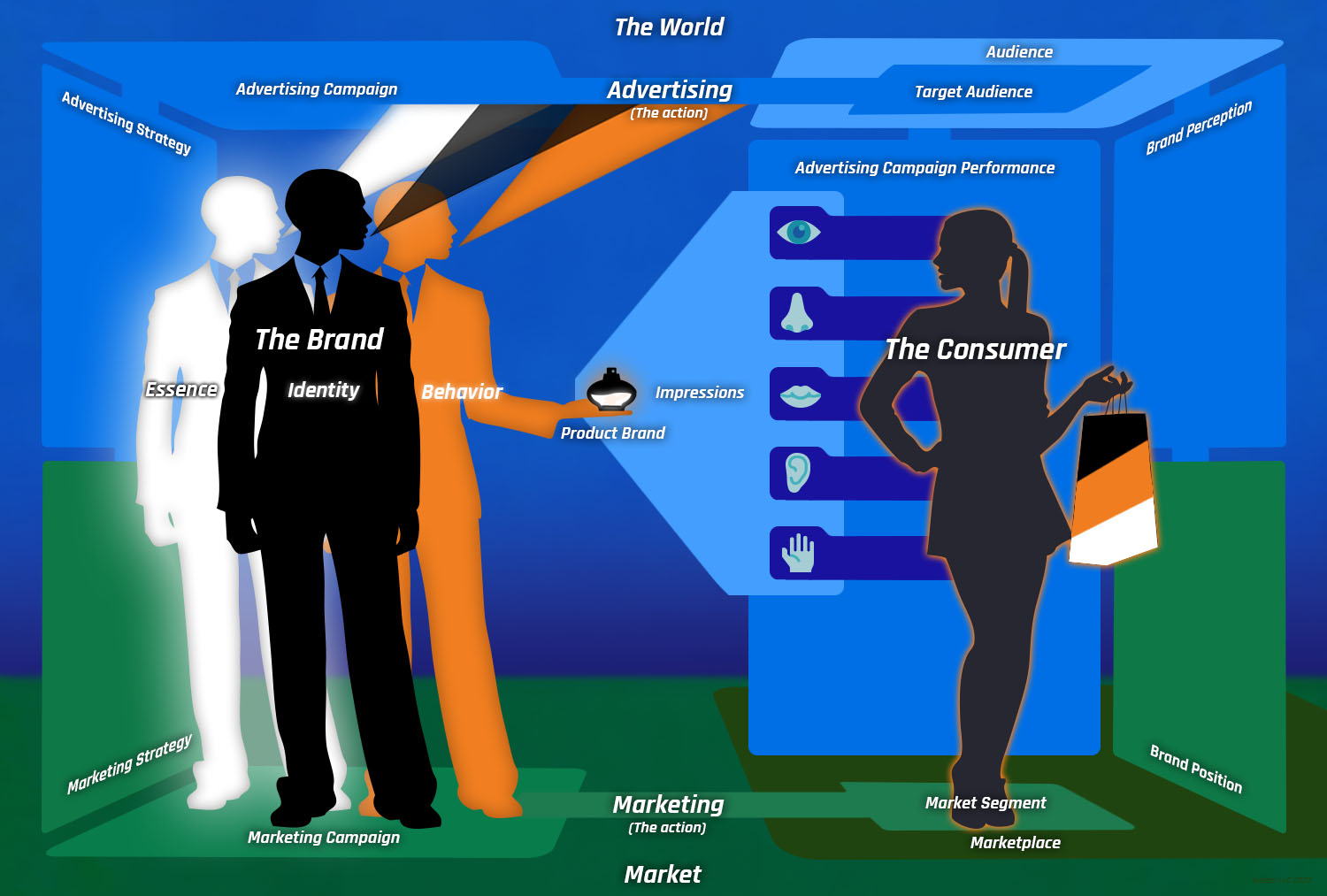Branding
Elevate your identity, and captivate your audience—discover the power of compelling branding with Avozar, where every design tells a unique story.
The Brand
The essence behind the identity

The Brand
A Brand is an in-depth defined concept subject that expresses its purposes artistically.
Branding
Entity creation.
Brand Foundations
The 3 pillars of branding.

The Brand Essence
The brand’s character.
Brand essence is the core characteristic that defines a brand. It is an intangible attribute that separates your brand from your competition’s brand by your audience. It is emotional and based on feelings. A brand essence is intangible for your audience, unique to your brand, and, most importantly, reliable.

Brand Identity
The expression of the Brand.
Brand identity is the visible elements of a brand, such as color, design, and logo, that identify and distinguish the brand in consumers’ minds. Brand identity is distinct from brand image. Designs its logo. Uses colors, shapes, and other visual elements in its products and promotions.

Brand Behavior
The brand interaction.
Refers to the actions, values, and attitudes exhibited by a brand in its interactions with customers, employees, and the public. It encompasses the way a brand conducts itself, communicates, and fulfills its promises. Positive brand behavior often aligns with the brand’s values,
Core Values
Brand values are a set of guiding principles that shape every aspect of your business. They’re placed at the very core of your brand and are there to dictate your brand message, identity, and personality. Investing in your brand is crucial if you want your business to be unique in a crowded marketplace.
Value traits:
- Dependability
- Reliability
- Loyalty
- Commitment
- Open-mindedness
- Consistency
- Honesty
- Efficiency
Personality
Personality traits such as trustworthy and desirable can help build customer confidence. Brands that connect to the consumers emotionally often carry the traits of desirability such as allure or exclusivity. With trustworthiness, a brand can strengthen its belief in consumers to maintain its quality standards.
Personality traits:
- Sincerity
- Excitement
- Competence
- Sophistication
- Ruggedness
Archetypes
Reflects the personality of brands and serves to better align personality type with specific Customer Personas. As it applies to brands, this idea of archetypes is fairly universal and may be particularly effective as an orienting tool for brand managers looking to focus the efforts of their team.
Archetypes traits:
- The Innocent
- Everyman
- Hero
- Outlaw
- Explorer
- Creator
- Ruler
- Magician
- Lover
- Caregiver
- Jester
- Sage
Characteristics
Brand Characteristics are the core values and fundamentals that showcase the true essence of the brand. They are a set of attributes that are identified as the physical, distinctive, and personality traits of the brand similar to that of an individual
Characteristic traits:
- Audience Knowledge
- Uniqueness
- Passion
- Consistency
- Competitiveness
- Exposure
- Leadership
Brand Types
Building strong and lasting relationships.
- Corporate Brand
- Product and Service Brand
- House Brand
- Employer Brand
- Cause Brand
- Community Brand
- Culture Brand
This branding is where the Corporate Name is the actual Brand. Corporate branding gives each product, service, or anything, the strength of the corporate brand values, characteristics, and positioning, a well-positioned brand will do well when positioning its products saving on advertising and marketing campaigns. The better the branding the less effort for Advertising and Marketing to be effective.
This is where each individual product has its own Brand and character. With this strategy, the Corporate Name is either totally or virtually absent due to the unique values, personality, identity, and positioning of the Product Brand. This Brand type implies that every new product the company brings on to the Marketplace it becomes a “New Brand” and it can be positioned precisely in the Marketplace. Product Branding makes it easier for the Corporate Brand performance when positioning new products, however, if a product is not successful or is involved in a marketing disaster, the bad consequences will not affect to the company name. Product Branding is costly, Advertising will take most of the budget when positioning, competitive advantage and strong positioning in the Marketplace is very necessary for a product to succeed.
This branding type uses both ideas, the Corporate Name and the Product Brand Name are placed side by side. This allows the Product Brand to have its own Identity and Positioning by drawing strength from the values and some if not all characteristics of the Corporate Brand, this tends to give assurance related to the quality of the Corporate Brand. One thing to consider is where the product fails in the marketplace may cause damage to the Corporate Brand.
This brand is focused on the employee’s understanding of the visions, mission, goals, plans, and services of the company. It educates employees so they to up-hold the Corporate Brand to their customers. The mission of this brand is to create a Corporate Brand Image and Internal Identity that penetrates through national boundaries and resonates with local cultures on the missions or the promises of the Corporate Brand.
This Brand it’s specifically designed to attract customers when associating the company with a Cause or Purpose with people, prospectors, or customers who will find it beneficial. Most of the time this might be a percentage contribution of company sales to charitable or other types of organizations such as Cities, Councils, Wildlife Preservation, Student Financial Aid, and others.
Showing the good of a company by doing things for the community in which it and its employees participate in outreach programs to help the needy, support the elderly, contributions to public education, Etc. It’s a promise to the people in the community that this company will be beneficial for them and their families as a partner.
This makes the promise to employees concerning their working environment and relationship with their leaders. In this case, “promises” are different from guarantees and opportunities in that they are offered free of encumbrances.
Brand Functions
Powerful concoctions of the marketplace.
Brands are interesting, powerful concoctions of the marketplace that create tremendous value for organizations and for individuals. Brands serve several functions based on navigation, reassurance, and engagement.

The Brand as a Promise
Think of a Brand as a promise, a promise your organization can keep, a promise you make to your clients, prospects, vendors, and even your employees. This promise is promoted internally and externally, you keep it in any business relationship activity, every corporate decision, every action, and every interaction with customers, prospects, employees, and vendors. The promise builds encouragement, pride, and effort, it drives budgets, stops arguments, vanishes confusion, it guides and drives business activities in any corporate system to achieve any goals. If everyone in the organization internally and externally knows what the promise is, politics and personal business issues start to disappear.

Brand as an identifier
Brands play a role in terms of communication and identification. They offer guidance, convey an expectation of quality, and help and support to those making purchase decisions. Brands make it easier for consumers to interpret and digest information on products. A name, sign, symbol, design, term, or some combination of these things identifies an offering and helps simplify choice for the consumer.

Brand as an asset
A high reputation in the marketplace can drive price premiums and customer preference for goods from a particular provider.

Brand as perceptions
The sum total of everything individuals believe think, see, know, feel, hear, and experience about a product, service, or organization. The perceived purchasing risk is thus minimized, which in turn helps cultivate a trust-based relationship.

Brand as a “mind share”
The unique position a company or offering holds in the customer’s mind, is based on their past experiences and what they expect in the future.



